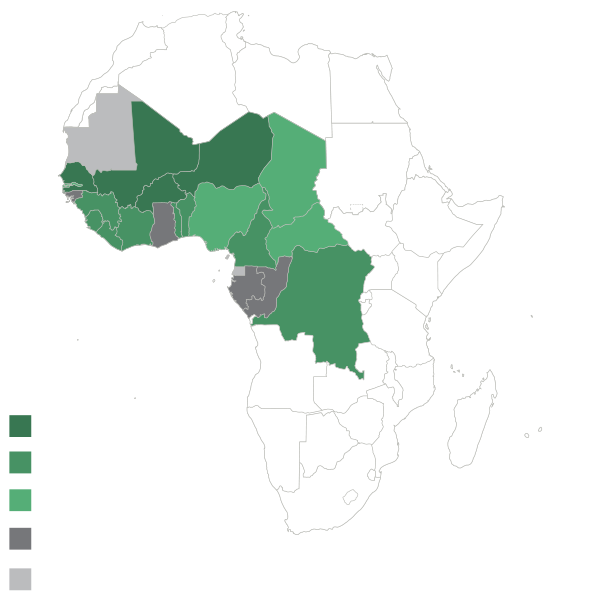The situation in eight other countries can be characterized as promising.
Can seed-producing cooperatives play a role in delivering improved seed varieties into the hands of smallholder farmers? With no breeding of their own and generally limited marketing and sales capacity beyond their own region, this requires partnerships. Despite the constraints, several strong examples of effective business models were identified.
In the most basic model, a seed cooperative sources foundation seed from national authorities or programs organized by FAO or WFP which is used for multiplication by its members. Seeds are distributed among members and sold to neighboring farmers. More advanced seed producing cooperatives partner with national or international research institutes to test and select varieties and work with seed companies, NGOs or government agencies to distribute the seed. Whether these examples can be identified in countries not only depends on the maturity of cooperatives but also on the presence of research and distribution partners, which can be influenced by the quality of the regulatory environment.
Based on an assessment of business models, which looked at the maturity of cooperatives in each part of the business model and the existence of partnerships, strong examples of seed-producing cooperatives were found in four countries – Burkina Faso, Mali and Niger and Senegal. The situation in eight other countries – Benin, Cameroon, Côte d’Ivoire, Democratic Republic of Congo, Guinea, Liberia, Sierra Leone and Togo – can be characterized as promising.
Variety testing and selection
Although seed-producing cooperatives do not have their own breeding programs, they do know the preferences of their members and clients and are familiar with the local growing conditions. Therefore, more advanced cooperatives partner with national and international research institutes to select and test varieties that are suitable for local conditions.
Union Madda Ben de Falwel in Niger is probably one of the few cooperatives that can claim it has an ICRISAT seed variety named after it. This reflects the far-reaching cooperation with ICRISAT’s millet breeding program. Members of Madda Ben work with ICRISAT on participatory variety selection and variety testing. So far, four new millet varieties have been introduced as a result of this cooperation.
Seed production
Seed-producing cooperatives provide training and support to their members to ensure that the seed is produced according to quality standards set by national authorities. Some have their own technical staff in-house or use the technical support services of their umbrella organizations. Others rely on technical support provided by government agencies. The latter can be cost effective, although it can make cooperatives reliant on outside services for their core business.
Coopérative Agricole de Bama in Burkina Faso has 200 seed producers operating in irrigated land, which means it can produce seeds in the rainy season and the dry season. It produces commercial seed as well as early generation seed for the national research institute INERA and seed company NAFASO. In cooperation with its partners, it trains 10-15 new seed producers annually and provides capacity-building services to existing growers.
Seed processing
The vast majority of cooperatives report that seed processing (threshing, cleaning and sorting) is done manually. Some make use of the facilities of public agencies, as is the case in Sierra Leone, Guinea and Côte d’Ivoire, or have contracts with private seed companies that have seed-processing plants, as in Niger, Mali and Burkina Faso.
Coopérative Sikolokoloton in Mali produces OPV seed for millet, sorghum, maize and cowpea that it distributes in its own region. It is one of the few cooperatives that reported having its own seed treatment and conditioning unit. The unit has a capacity of over 10 tons per day.
Seed distribution
Distribution activities vary across the region. For many cooperatives, seed distribution remains fairly local, although some have set up their own distribution networks. In some cases, federations or national umbrella organizations of seed-producing cooperatives are responsible for nationwide distribution, such as FUPRO in Benin, RNCPS in Senegal and UNPSB in Burkina Faso. Others benefit from contracts with seed companies. Although some cooperatives distribute seed in various package sizes, in general the seed is distributed without labeling or branding, which would be helpful to build customer recognition and loyalty.
Jirkur Seed Cooperative Society in Nigeria was set up by a group of community seed producers in Borno State to continue the sustainable supply of quality seed in the region after an IITA-supported project ended. In 2010, it was one of the first cooperatives to be officially registered by the National Agricultural Seed Council. Initially consisting of ten members, it has now grown to 200 members. Its production has also increased, from 50 tons to nearly 1,000 metric tons annually. Through a network of agro-dealers at village level, it has progressively increased its market share and is currently the main certified seed distributor in northeastern Nigeria.
Adoption strategies and capacity building
Although providing agricultural training to its members is a regular activity for cooperatives, few seem to offer these services to customers. Demonstration plots, field days and the use of local radio and posters are among the most common promotional strategies. In some cases, cooperatives participate in donor-funded capacity building programs for women farmers, such as Coopérative de Paoskoto in Senegal and Société Coopérative Chongagnigui in Côte d’Ivoire.
Groupe d’Initiative Commune Nguegoue Thomas in Cameroon specializes in the production of seed potato. It currently produces six varieties that are mainly sold locally. As part of the cooperative’s after-sales strategy, buyers can register for a (paid) training program. As part of a train-the-trainer program, cooperative members trained 15 government officials on roots and tubers.




